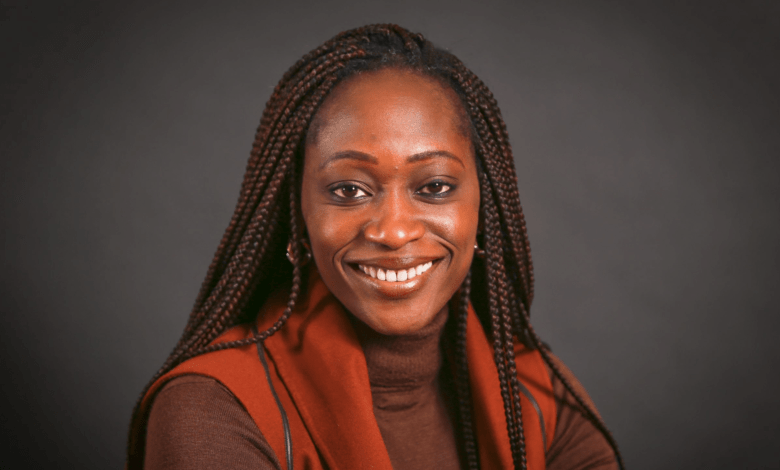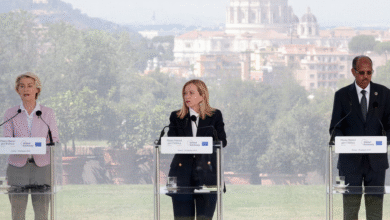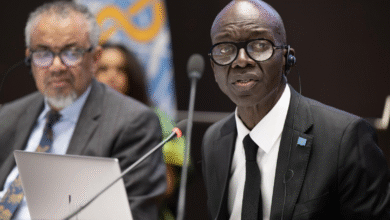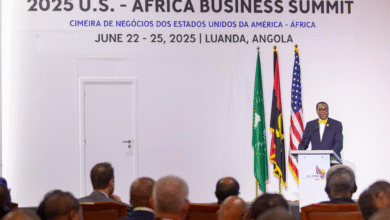Hafsat Abiola : “We are watching African women change the world”
A renowned human rights activist, Hafsat Abiola is the chairperson of the Women in Africa Initiative (WIA). In just a few years, the network has supported, trained and mentored several thousand women entrepreneurs. The next goal is to set up training centers across Africa.

By Dounia Ben Mohamed
How did the Women in Africa Initiative (WIA) come about?
Aude de Thuin, founder of the Women’s Forum, organized an annual summit in Deauville in northern France. After the 2008 financial crisis, the idea was born to create a similar event for Africa. At the request of African women entrepreneurs who wanted to benefit from a similar network, Aude de Thuin sent out invitations and founded WIA in 2016, modeled on the Women’s Forum. We used to hold an annual meeting in Marrakech, Morocco. That had to be stopped because of COVID. So we looked at our business model, at what we could do in the absence of physical meetings. We came up with some new ideas. In addition to face-to-face meetings, we had a philanthropic foundation. Its main program was to support training, mentoring and coaching for women entrepreneurs. So we followed some leads with the WIA54 program, which was to select one woman in each African country and train her. That’s what we did for a couple of years.
You became President in 2018. How has WIA developed since then?
I was appointed President in the second year of WIA’s existence. You know, I did my Masters and then a Masters in International Development in Beijing. Anyone who has studied there knows that the Chinese love numbers. So when a program is set up, if it reaches a thousand people, it’s appreciated; if it reaches 100,000 people, it’s appreciated even more; and if it reaches a million, the interest is multiplied. Do you understand what I mean? I adopted this vision when I was in China: think bigger. Africa has 1.4 billion people. We can’t just train and support one African woman entrepreneur per country per year. So I came up with the idea of scaling up our training programs, democratizing them, making them more accessible, reaching more people.
Who were your partners in achieving this change of scale?
We were lucky enough to have one of our team members, Jeffrey, who was wonderful. He convinced the Coca-Cola Foundation to support our vision with the JAMII Women program. The Foundation gave us the funding we needed to train 7,000 women in three countries in the first year and three more in the second. This has enabled us to start the third year, which will support 6,000 women. In the end, thanks to your support, we will have trained 20,000 women entrepreneurs in ten countries.
We are also working with the African Development Bank (AfDB) through the AFAWA programme, Affirmative Action for Finance Action for Women in Africa, which guarantees 300 million euros for women entrepreneurs in Africa. In practice, this money is invested in various commercial banks in Africa. In return, they lend, thanks to the AfDB guarantee. Many of these banks are reluctant to invest in women because they believe they do not have sufficient expertise in mesofinance, which requires keeping accounts, as opposed to the informal economy and microfinance. AFAWA plans to release five billion dollars for women-owned and managed small and medium-sized enterprises by 2026.
We want these women to be making a real difference in Africa
Beyond funding, how do you encourage women to become entrepreneurs?
Having money is one thing, but being able to benefit from it is another. And that’s where WIA comes in. In Central Africa, we are working with the AfDB to train women’s cooperatives on how to write a business plan, present a business case, apply for loans and obtain financing. This initiative covers four countries and targets some 3,000 women. Again, as I learned in China, this is a change of scale.
But not all of our programs are on this scale. The WIA Young Leaders program involves only five to ten African women. It was developed in partnership with Dior, the investment bank Lazard, Huawei Northern Africa, KPMG France and TotalEnergies. We receive applications from across the continent and only a few are selected for this program. The aim is to find the most inspiring, talented and influential women in Africa. We then organize a business trip to a major business capital. This trip gives them access to a high-level professional network, the chance to meet experts in their field and high visibility. For example, Alexandra Hughes, an executive search firm, organized a masterclass on the importance of human capital. KPMG also organized a training session. Finally, Lazard Bank taught them how to raise large sums of money. You know, when they say « Series A, Series B », that’s the language of engineers. You have to master that vocabulary.
As well as training, these women also benefit from mentoring. For example, Christophe Bringer, Head of the Africa Desk of Transaction Services KPMG, is mentoring a Nigerian woman based in Canada. A qualified lawyer, she wants to work on major legal contracts for infrastructure in Africa. That’s her dream. And that’s exactly what Christophe Bringer is doing at KPMG. We want these women to be at the forefront of making a difference in Africa, and to do that we need to make sure they have all the information they need. The key is to ensure that this knowledge is made available to African women. To do this, we have continued to use an effective tool since the pandemic: regular webinars with experts.
In particular, you organized a webinar with Zambian economist Dambisa Moyo…
Dambisa: Yes! She’s fantastic. She had a huge success with her book Dead Aid: Why Aid Is Not Working and How There Is a Better Way for Africa (Farrar, Straus and Giroux, 2009), L’Aide fatale. Les ravages d’une aide inutile et de nouvelles solutions pour l’Afrique (Lattès, 2009). She has published numerous bestselling books on global issues. She has worked as a consultant for the World Bank. I met her on a program at Harvard University, where she was studying. She joined our webinar to talk about macroeconomic trends. Coming from Goldman Sachs, she shared her forecasts with us to help us better analyze the market.
We also brought in a number of other people, including Vanessa Moungar, Head of Diversity and Inclusion at LVMH, the world’s leading luxury goods company. You know, we have so many stars in Africa. I’m also thinking of Yvonne Bettkober, Head of Organizational Development and Transformation at Volkswagen. Our webinars have been attended by more than 12,000 people in total, and our training courses by tens of thousands.
The more tools and knowledge we give these women, the greater the chances of creating jobs and a healthy economic environment. So instead of a hundred businesses, we could have five hundred. You know, it can make the difference between an unstable Africa, plagued by coups, urban violence and conflict, and a stable, prosperous Africa where the economy benefits everyone. It is this second vision of the continent that I prefer. But to get there, we need to create critical mass and empower women.
Having a network makes it easier to expand trade
What are the next steps for the WIA initiative?
I’m very happy with what we’re doing and how we’re doing it. But I want to do more. For me, the next step is to set up centers. We already have one in Gabon, where we have premises. In Senegal, we also train women in a room that we occasionally rent. We now want to expand these sites to multiply our impact.
I love the quote attributed to the Greek mathematician Archimedes: « Give me a lever and a fixed point and I’ll lift the world », which is a law of physics. It can be applied to the world of development. These centers provide a fixed point from which these women can get back on their feet. They concentrate the resources, tools and support they need. Then we watch them change Africa and the world.
As well as training and mentoring programs, WIA has built up a network over the years. What is its strength?
That’s what I wanted to say. For me, the most important thing is the way WIA promotes dialogue between African women across national borders. We have trained women in Kenya, Côte d’Ivoire and Nigeria. They shared a lot with each other during the training and now they are forming a network. They all emphasized how much it had helped them. They told me that was the most important thing. It allows them to share their skills and experiences. The Kenyan farmer learns about farming in Côte d’Ivoire. She can then draw inspiration from it if she sees similarities or, on the contrary, innovations. So it’s useful to create links. I want the Kenyan farmer to be able to export her products to Côte d’Ivoire one day. Thanks to this network, she will already have connections and friends in the country who can help her with her business. Having a network makes it easier to expand your business. If you look at Europe or even Asia, trade within these continents accounts for between 40 and 50 per cent of all trade. In Africa, intra-African trade is low, accounting for only 14.4% of total African exports. UNCTAD forecasts show that the AfCFTA (African Continental Free Trade Area) could increase intra-African trade by around 33%. And this is where Africa can really win.
Show the world that we too can excel
You invite women to dream bigger. What does that mean?
In countries where innovation is encouraged, Africans are in the teams. But on the continent, we are lagging behind. The Africans who are on the world stage, in America and France, are there because they have been supported from outside. So we need to create the right environment in Africa to retain our talent. That’s the point I want to emphasize. Yes, it’s important to dream big, but to do that we have to rely on excellence and demand the best.
You know, I think we women are sometimes very good at supporting others. But when it comes to our own ambitions, we sometimes settle for the minimum. Why not try to go beyond that, to hit the ball out of the park and open up the field of possibilities in Tunisia, Morocco, Egypt, Kenya or Ethiopia? Show the world that we can achieve excellence with the best production. We must demand that our products meet or exceed international standards. Let’s start. Let’s not be discouraged if we don’t reach that standard, but let’s set it and work hard to reach it.
Find out more :







